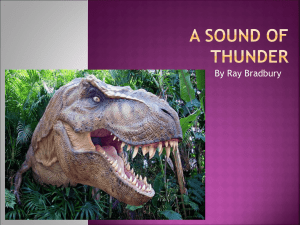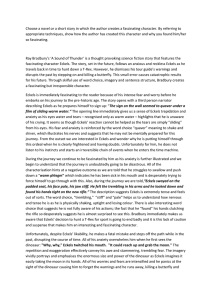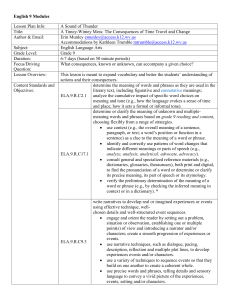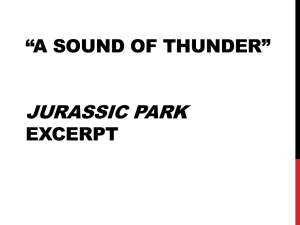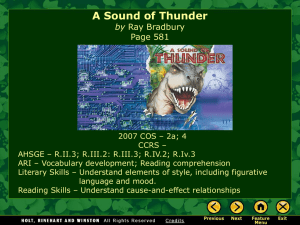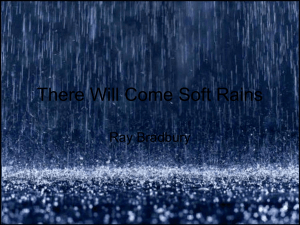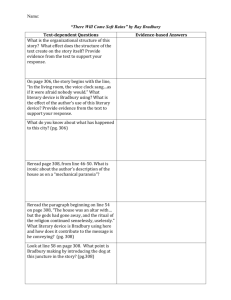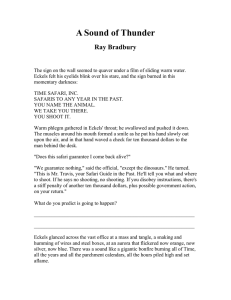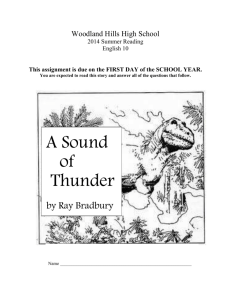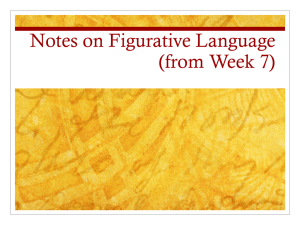Kocur Prompt for “A Sound of Thunder” The decisions that one
advertisement
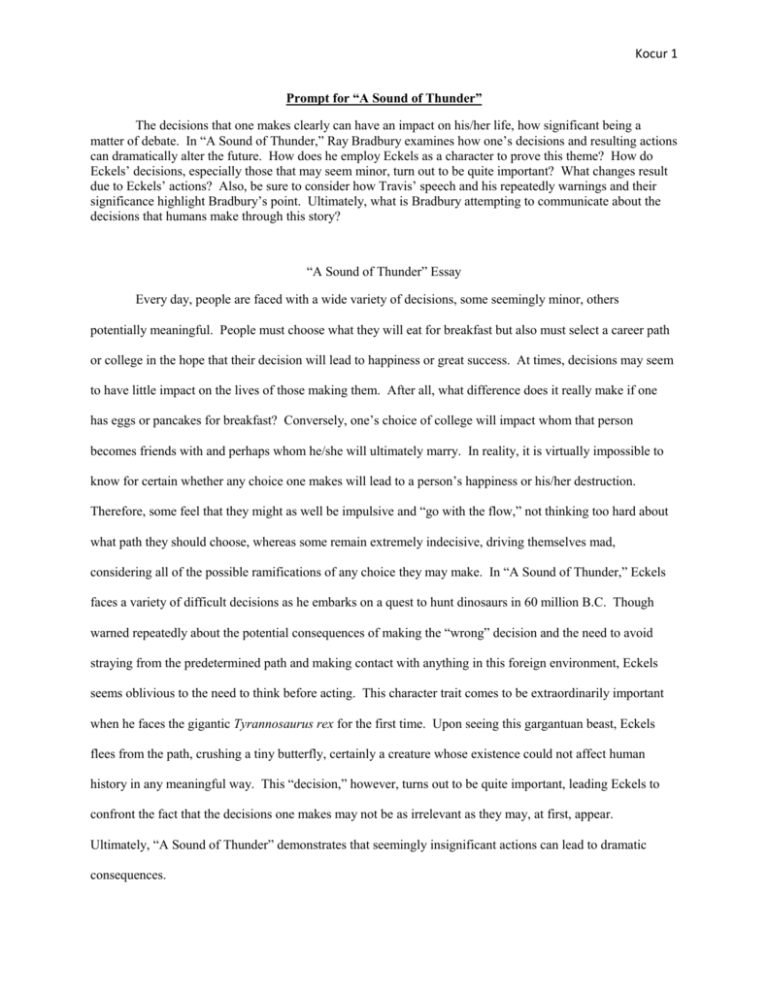
Kocur 1 Prompt for “A Sound of Thunder” The decisions that one makes clearly can have an impact on his/her life, how significant being a matter of debate. In “A Sound of Thunder,” Ray Bradbury examines how one’s decisions and resulting actions can dramatically alter the future. How does he employ Eckels as a character to prove this theme? How do Eckels’ decisions, especially those that may seem minor, turn out to be quite important? What changes result due to Eckels’ actions? Also, be sure to consider how Travis’ speech and his repeatedly warnings and their significance highlight Bradbury’s point. Ultimately, what is Bradbury attempting to communicate about the decisions that humans make through this story? “A Sound of Thunder” Essay Every day, people are faced with a wide variety of decisions, some seemingly minor, others potentially meaningful. People must choose what they will eat for breakfast but also must select a career path or college in the hope that their decision will lead to happiness or great success. At times, decisions may seem to have little impact on the lives of those making them. After all, what difference does it really make if one has eggs or pancakes for breakfast? Conversely, one’s choice of college will impact whom that person becomes friends with and perhaps whom he/she will ultimately marry. In reality, it is virtually impossible to know for certain whether any choice one makes will lead to a person’s happiness or his/her destruction. Therefore, some feel that they might as well be impulsive and “go with the flow,” not thinking too hard about what path they should choose, whereas some remain extremely indecisive, driving themselves mad, considering all of the possible ramifications of any choice they may make. In “A Sound of Thunder,” Eckels faces a variety of difficult decisions as he embarks on a quest to hunt dinosaurs in 60 million B.C. Though warned repeatedly about the potential consequences of making the “wrong” decision and the need to avoid straying from the predetermined path and making contact with anything in this foreign environment, Eckels seems oblivious to the need to think before acting. This character trait comes to be extraordinarily important when he faces the gigantic Tyrannosaurus rex for the first time. Upon seeing this gargantuan beast, Eckels flees from the path, crushing a tiny butterfly, certainly a creature whose existence could not affect human history in any meaningful way. This “decision,” however, turns out to be quite important, leading Eckels to confront the fact that the decisions one makes may not be as irrelevant as they may, at first, appear. Ultimately, “A Sound of Thunder” demonstrates that seemingly insignificant actions can lead to dramatic consequences. Kocur 2 Bradbury first demonstrates the need to consider one’s actions and their potential consequences through Travis’ repeated warnings to Eckels. When Eckels first arrives at Time Safari Inc., Travis suggests that Eckels tear up the contract that details the conditions that he must follow if he wishes to travel back in time and hunt dinosaurs, knowing that any negligent action any time traveler takes could profoundly affect the future. Of course, being driven by the desire for adventure, Eckels does not seriously consider the possibility that he may not be ready for such a quest and, therefore, adheres to his original decision to proceed with his trip, a decision that he will soon come to regret. Later, Travis again warns Eckels of the dangers of stepping off the predetermined path, detailing the potential impact of killing a mouse. In this passage, Travis explains to Eckels how the death of one mouse ensures that its descendents will not exist. This, in turn, could possibly lead to the starvation of a fox and its descendents, eventually resulting in the demise of a caveman and his family. He speculates that Rome may never become a great civilization, Queen Elizabeth may never be born, and America may never come to be, all because of the death of a single mouse. These hypothetical changes in human history clearly illustrate Bradbury’s intended theme, that even events that seem insignificant may, in fact, lead to profound changes that one could not have possibly foreseen. In perhaps the most critical scene in the entire story, Bradbury reinforces the story’s powerful message through Eckels’ confrontation with the t-rex. Though Eckels had been warned repeatedly to remain on the path, he was clearly shaken before even arriving in the past, foreshadowing his panicked reaction to seeing the t-rex. Upon encountering the dinosaur, Eckels flees, mindlessly and unknowingly leaving the path and briefly venturing into the jungle. Up to this point in the story, Bradbury had ironically described the t-rex and time machine in great detail, leading the reader to expect the massive dinosaur and/or the intricate technological innovation to change the future in some way. However, it is Eckels’ killing of a tiny butterfly, something he discovers upon returning to 2055 A.D, that actually dramatically impacts history. Though the reader is, at first, unaware of this fact, one minor step in the wrong direction, a mistake that accidentally kills a tiny butterfly, has drastically altered all of recorded history. Eckels’ trip back to the present and what he shockingly discovers serve as a final reminder of the impact that Eckels’ decisions have had. Bradbury’s mention of 1492, 1776, and 1812, all significant historical Kocur 3 dates, as they return to 2055 A.D., imply that history has already been altered. Upon arriving at Time Safari Inc., Eckels discovers that the language has changed and Deutscher, who had lost the election prior to Eckels’ journey through time, is now president. In addition, Bradbury describes the scene, which at first must appear similar to the one that Eckels left behind upon departing, instead consists of “not quite the same man” and “not quite the same desk”; even the air, itself, felt subtly different. Bradbury’s brilliant description of the citizens as “chess pieces blown in a dry wind” indicate that Eckels’ actions may have affected the lives of all people in some way. Furthermore, his final metaphorical depiction of the butterfly as “a small thing that could … knock down small dominoes and then big dominoes and then gigantic dominoes all down through the years across time” serves to highlight just how impactful that its death may have been, a point that Bradbury was clearly attempting to hammer home as the story comes to a close. “A Sound of Thunder” clearly demonstrates Bradbury’s intended theme, that seemingly minor acts can dramatically alter the future. As the story begins, Eckels is warned repeatedly to reconsider his actions and perhaps forgo the trip altogether, but he decides to proceed with his venture to the past and not to heed Travis’ advice. Travis makes it quite clear that any deviation from the intended path and the resulting change in the past could lead to meaningful alterations to the future, but once again, Eckels chooses to ignore Travis’ warning. Upon seeing the Tyrannosaurus rex, Eckels panics, leaving the path and killing a mere butterfly, an act that later comes back to haunt him. His return to 2055 A.D. leads to his discovery of changes in the language, the country’s leadership, and even the man behind the desk. Bradbury’s descriptions as the story nears is conclusion imply that the lives of all citizens may have been impacted as well. Ultimately, despite the repeated warnings to Eckels to remain on the path and the detailed descriptions of the dinosaur and time machine, it is the death of a butterfly that is responsible for changing much about America in 2055 A.D. and, quite likely, human history itself. Though seemingly ironic, Bradbury clearly wanted the reader consider the importance of one’s decisions and actions, something that Eckels did not do in “A Sound of Thunder.”
